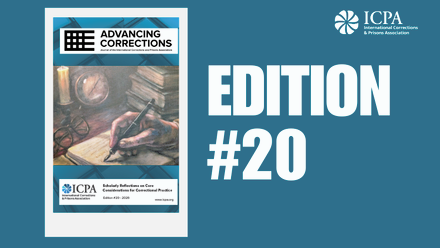Review of the ICPA Virtual Conference
The recent ICPA Virtual Conference successfully engaged more than 900 delegates from over 60 countries listening to some 70 workshop presentations and plenaries delivered to accommodate different time zones!
A number of members of the ICPA R&D Network participated in the Conference and the following is a summary of some of their feedback. Included as well at the end is a much more detailed and informative review provided by a long-standing R&D Network member, Steve Pitts from the UK.
A Summary of Themes Emerging From The Conference
Innovation in Action
- The global correctional discussion seems to have moved from what ‘should be happening’ to ‘what is, or is going, to happen’. The fact that real ‘change’ is occurring was evident across a number of correctional domains and around the world.
- The pandemic seems to have forced the hand of many jurisdictions to implement innovations that might otherwise have taken years to progress! Examples are the greater acceptance of community options and more awareness of the importance of supporting staff well-being!
- The Conference highlighted the innovative role & involvement of volunteers (one of the most powerful themes of the conference) … with examples from Japan, Singapore, Canada, and the USA, including the impact of ‘remote’ approaches due to Covid19. There was emphasis on “seeing volunteers as a key part of the eco-system of support” and an important point that was discussed was that volunteers should not be treated as a ‘free’ resource. It is critically important to establish frameworks of support for volunteers including clarity of role, space, training, recognition … etc. Also highlighted was the fact that volunteers can also offer support to staff.
A Focus on Increasing Cultural Competence:
- And especially in meeting the challenges of over-representation of indigenous people … e.g., Australia, NZ, Canada.
- Future facilities should be more humanizing, and trauma focused, holistic, drawing on traditional practice, have a smaller footprint, and be connected to the communities where people reside. The principle of self-determination will be more to the fore: “Nothing about us without us”.
Community Reintegration:
- The value of improved work in the community with diverse groups, including those at high risk of reoffending, indigenous populations, the elderly, the mentally ill and the intellectually disabled.
- (HONG KONG) attention to individual responsivity, to building “social capital”, and to engaging social resources including NGOs and community volunteers.
- (JAPAN) the importance of focusing on a comprehensive continuum of care protocols and mechanisms.
What Works … and What Else Works …
- With a renewed focus on measuring outcomes … e.g., in NSW, a quite sophisticated model for measuring prison performance.
- But also, a focus on What Else Works … as collaborative, creative and participatory processes that can lead to significant changes in delivery of prison services and ways to “engage the dis-engaged”.
- The Twinning Project in the UK
- Arts Project in Canada
- Uganda PEN project restoring dignity through creative writing programs that used videos of prisoners reading their own poetry expressing “narratives of lived experience” … referred to as a “pedagogy of hope”
And Some Other Content Themes Worth Mentioning …
- A special session focused on prison challenges in Africa (including Kenya, Uganda, and Burkina Faso); including the challenges of upgrading overcrowded, inappropriate, colonial era prisons, decongestion, development of standards protecting human rights, operationalizing the principle of public equivalence in prison health etc.;
- Digital technology is changing the rehabilitative potential of prisons;
- Machine learning approaches to data analysis are providing new ways of understanding risk assessment;
- Structured therapeutic intervention approaches that preserve human dignity can be implemented as an alternative to counter-productive punitive segregation methods (e.g., North Carolina, Canada);
- Australian & NZ presentations on understanding gang affiliation and violence in prisons;
- The application, practice and impact of trauma informed intervention … a powerful Distinguished Scholar Lecture delivered by Dr. Anna Motz, a psychotherapist working with violent women in the UK.
Members of the ICPA Executive Board participated as Moderators of many sessions. All in all, the Virtual Platform received rave reviews, allowing for more participation from all parts of the world and now extending a challenge for ICPA to balance ‘in person’ vs. ‘virtual’ modalities for sharing knowledge with the international corrections community. Is there room for both approaches?
The following are some reviews of the Conference provided by members of the ICPA R&D Network. Their unanimously positive reaction to the Conference is obvious.

